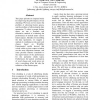Free Online Productivity Tools
i2Speak
i2Symbol
i2OCR
iTex2Img
iWeb2Print
iWeb2Shot
i2Type
iPdf2Split
iPdf2Merge
i2Bopomofo
i2Arabic
i2Style
i2Image
i2PDF
iLatex2Rtf
Sci2ools
106
click to vote
NLPRS
2001
Springer
2001
Springer
An Empirical Study of Feature Set Selection for Text Chunking
This paper presents an empirical study for improving the performance of text chunking. We focus on two issues: the problem of selecting feature spaces, and the problem of alleviating the data sparseness. To select a proper feature space, we use a heuristic and exhaustive method of evaluating the performance of models under various feature spaces. Besides, for smoothing the data sparseness, we suggest a method of combining words and word classes based on WordNet. Experimental results showed that words within a given context window are the most important features, and some peculiar features contribute to the improvement of the performance for the particular chunk types. Furthermore, the partial combination of word classes and words gives not only a smoothing effect but also the reduction of the feature space.
Related Content
| Added | 30 Jul 2010 |
| Updated | 30 Jul 2010 |
| Type | Conference |
| Year | 2001 |
| Where | NLPRS |
| Authors | Young-Sook Hwang, Yong-Jae Kwak, Hoo-Jung Chung, So-Young Park, Hae-Chang Rim |
Comments (0)

